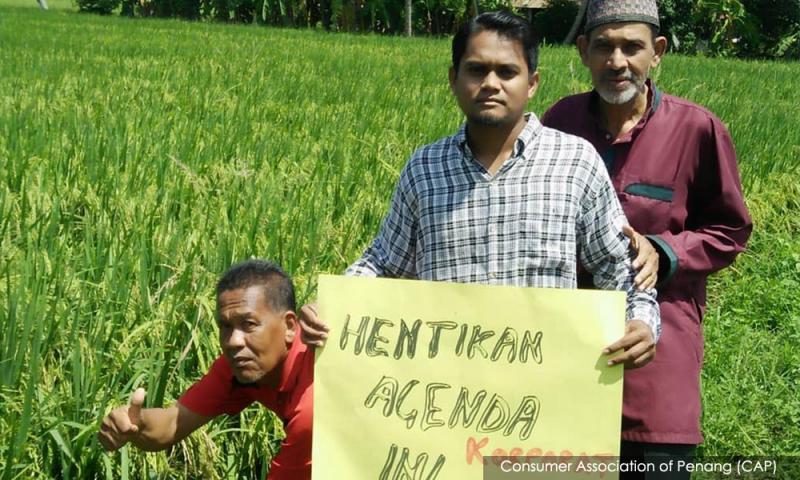NGOs oppose genetically modified rice field tests
LETTER | Referring to the announcement on the Ministry of Water, Land and Natural Resources' (KATS) website, the National Biosafety Board (LBK) is evaluating an application from the Malaysian Agricultural Research and Development Institute (Mardi) to conduct a confined field trial on genetically modified rice (GM rice) that is tolerant to glyphosate and resistant to padi diseases caused by bacteria and fungi.
This experiment will reportedly to be carried out at Mardi's Arau Station, located in the Tambun Tulang area, in Perlis.
The GM rice that will be tested comes from the well-known Malaysian variety of MR219, with an additional characteristic of being tolerant to glyphosate herbicide and susceptibility to bacteria Xanthomonas oryzae pv oryzae and fungus Pyricularia spp.
This GM rice is not produced by a typical hybrid method, but it is produced in a laboratory using genetic modification technology to create a novel GM rice that does not exist in nature. The application to plant GM padi in the field has raised serious concerns over its impact on humans and the environment.
There is a risk of genetic contamination of conventional rice and wild rice with this modified transgenic material when it is planted in the field.
While developers claim that field trials have measures in place to contain and prevent gene flow escapes into the environment, among them by implementing the test in a gated area and within netted structures, there is still a risk of escape of foreign genes through insects, birds or other animals, or even machinery and workers.
In fact, according to the GM Contamination Register, up to 2014, padi crops have the highest number of contamination incidents through field experiments, although no GM rice is grown commercially so far anywhere in the world.
However, what is more important, we do not want GMO products to be commercialized after the field experiment.
Genetic engineering is an inherently unpredictable process associated with unintended effects. For example, recent studies have detected altered metabolite levels in glyphosate tolerant rice and maize varieties. The maize line had significant increases in compounds that may be toxic to people in certain contexts.
The inclusion of a gene to confer fungal resistance in this GM rice also raises concerns, as this gene encodes for a protein that regulates gene expression. This introduces the possibility that the expression of numerous genes may be unintentionally altered, with potential consequences for food safety, such as disrupted nutritional, allergenic or toxin profiles; or altered agronomic properties that may compromise the high yielding properties of MR219 rice, thus risking our food security when this rice is commercially planted.
This GM rice that is specially designed to tolerate glyphosate will increase the use of chemicals, and the selling of seed packaged with glyphosate will only increase the cost to farmers and benefit certain parties.
When the padi is grown in the fields and sprayed with glyphosate, all weeds, including weedy rice and other varieties of rice, will die except for this GM rice. This means that adjacent padi fields also have no choice, but to use the same seeds and chemicals.
This is a form of exploitation of farmers by forcing them to buy and use more herbicide that will benefit chemical companies. Glyphosate toxicity has been widely documented in both independent and industry data. Most recently Bayer, which bought over Monsanto, lost three court cases in the US for not warning of the cancer risks of glyphosate herbicides that had resulted in people suffering from non- Hodgkin Lymphoma.
Weed elimination strategies using herbicide-tolerant plants have been ineffective, as was the case with CL rice or Padi Kebal as it is called locally. After 10 years of use, weeds have become increasingly resistant and over time stronger chemicals have to be used.
There is very little information on this specific GM rice variety. No details appear to be publicly available at the molecular level to ensure that the genetic modification has not caused any unintended effects, which is crucial to ascertain safety, particularly for rice, a staple crop in Malaysia and the wider region.
If there is no such evidence, as required in the Cartagena Biosafety Protocol ratified by Malaysia in 2003, the GM rice should not be approved for field trials in Malaysia.
Mohideen Abdul Kader is the acting president of the Consumer Association of Penang (CAP).
Nurfitri Amir Muhammad is the coordinator of Food Security And Sovereignty Forum, Malaysia.
The views expressed here are those of the author/contributor and do not necessarily represent the views of Malaysiakini.
RM12.50 / month
- Unlimited access to award-winning journalism
- Comment and share your opinions on all our articles
- Gift interesting stories to your friends
- Tax deductable
